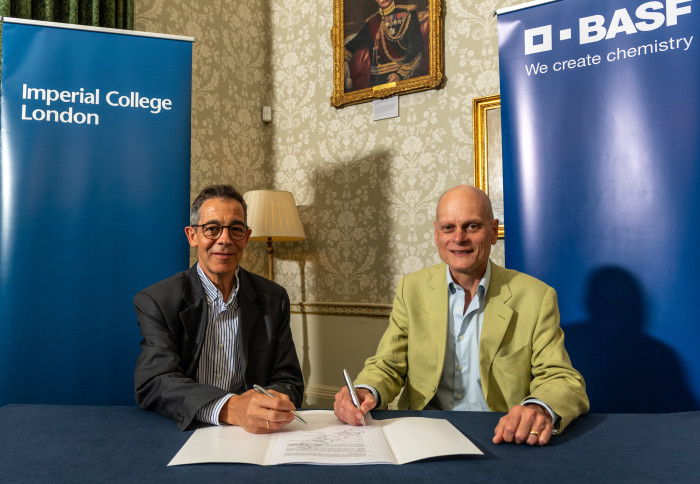Imperial and BASF in major partnership to advance future of chemical production

Imperial and BASF, the world’s largest chemical producer, have begun a new phase in their strategic partnership to advance modern chemical production.
The wide-ranging strategic partnership, which was extended with a new framework agreement on Monday, is generating know-how and intellectual property to enable the chemical industries to improve their performance, sustainability, and resilience.
As one of BASF’s strategic global partner universities, Imperial is collaborating with the company on a range of research that includes techniques to use energy and materials more efficiently and to replace fossil fuel-based feedstocks with renewable alternatives.
In addition to improving sustainability, the research could help industry become more resilient to supply shocks by enabling manufacturers to substitute raw materials and use highly distributed production facilities
A major focus is the development of continuous production methods – known as flow chemistry – for the synthesis of low-volume, high-value products such as pharmaceuticals, agrochemicals and speciality chemicals. The approach increases the efficiency, quality and safety of chemical manufacturing, and accelerates research and development by generating detailed experimental datasets at high throughput.
In this context an important focus is digitalisation. Professor Ruth Misener in Imperial’s Department of Computing, BASF / Royal Academy of Engineering Research Chair in Data-Driven Optimisation, said: “Like many fields, industrial chemistry is undergoing a digital transformation in the 21st century, and one of our strengths at Imperial is in applying digital technologies to automate and optimise chemical R&D and manufacturing. This can greatly benefit from new algorithms that can be used in research, for example, to make decisions on which experiments should be carried out next.”
In addition to efficiency and environmental benefits, the innovations in flow chemistry and other areas could help industry become more resilient to supply shocks caused by events such as the pandemic and the war in Ukraine by enabling manufacturers to more easily substitute raw materials and to deploy a larger number of smaller and more highly distributed continuous production facilities.
Wide-ranging partnership

Imperial and BASF are already connected through a large set of touch points at different levels of the organisations, and today’s framework agreement will enable the further growth of the partnership.
Professor Ian Walmsley, Provost of Imperial College London, said: “Imperial’s mission is to undertake world-leading research and education and to use these to benefit society, in particular through application in industry. Our strategic partnership with BASF is helping us to translate our expertise into practical insights and innovations that bring tangible benefits. We are delighted to expand that partnership, which focuses on multiple themes and draws on Imperial’s and BASF’s multi-disciplinary expertise to address problems of global significance, such as sustainable manufacturing.”
Dr Detlef Kratz, President, Group Research at BASF, said: “At BASF we’re committed to sustainability, which drives our innovation and is currently the greatest priority for the chemicals sector. Within our unique group research division we’re taking a long-term view on science supporting this goal. With that we are also focusing on capability development which fits perfectly to our academic partnership. In the long run this will result in innovative and sustainable products and production processes. We continue to look forward to further developing our fantastic partnership with Imperial.”
Transforming industry

Several Imperial departments are involved in the partnership, including Chemistry, Chemical Engineering, Computing, and Mathematics.
Professor Mimi Hii in Imperial’s Department of Chemistry, Director of the EPSRC Centre for Doctoral Training in Next Generation Synthesis & Reaction Technology (REACT), said: “In Imperial’s home for chemistry, the Molecular Sciences Research Hub, we are pursuing advanced work in flow chemistry, automation and data science, and it is great to join our world-leading expertise and resources with those of BASF to help drive innovations in the chemical industry by deploying the outcomes of our collaboration in industrial practice.”
“The cross-disciplinary approach and the impact-driven mindset are why we’ve selected Imperial as our primary academic partner in the UK – one of a select few strategic partners worldwide.” Dr Christian Holtze Academic Partnership Developer and Principal Scientist for Flow Chemistry at BASF
Much of the research is being carried out by doctoral students at two Centres for Doctoral Training – REACT and another in Modern Statistics and Statistical Machine Learning. BASF is also offering internships to PhD students and the organisations aim to train a new generation of PhD graduates with both industrial and academic research skills to help transform the chemical industries.
Professor Klaus Hellgardt in Imperial’s Department of Chemical Engineering, said: “We are excited to be working with BASF not only to advance the science and engineering, but also to train a new generation of chemists who are familiar and cognate in flow chemistry. To get modern techniques into companies you need champions, and you need to create these champions.”
The partnership has potential to make a significant impact across the UK and worldwide, reflecting Imperial’s international outlook and BASF’s status as a global company headquartered in Germany and located across hundreds of countries worldwide. Within the UK, it is enabling Imperial research to make an impact upon industry in regions such as the East Midlands, North West England and Scotland, where BASF’s UK operations and many of the UK’s internationally competitive chemical industries are based.
Dr Christian Holtze, Academic Partnership Developer and Principal Scientist for Flow Chemistry at BASF, said: “We appreciate the excellent infrastructure and cutting edge-research at Imperial. The cross-disciplinary approach and the impact-driven mindset are why we’ve selected Imperial as our primary academic partner in the UK – one of a select few strategic partners worldwide.”
Main image shows Dr Detlef Kratz (President, Group Research at BASF) and Professor Ian Walmsley (Provost of Imperial College London) signing the new framework agreement. Photo: Fergus Burnett.
Article text (excluding photos or graphics) © Imperial College London.
Photos and graphics subject to third party copyright used with permission or © Imperial College London.
Reporter
David Silverman
Communications Division